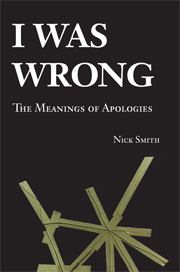Book contents
- Frontmatter
- Contents
- Acknowledgments
- Introduction: Apologies as a Source of Moral Meaning in Modernity
- Part One Apologies from Individuals
- 1 The Meanings of Apologies
- 2 Elements of the Categorical Apology
- 3 Apologies and Gender
- 4 Apologies in Diverse Religious and Cultural Traditions
- 5 Unusual Cases: Apologizing to Animals, Infants, Machines, the Deceased, and Yourself
- 6 The Relationship between Apologies and Forgiveness
- 7 Varieties of Apologies
- Part Two Collective Apologies
- Conclusion: Previewing the Meanings of Apologies in Law
- Notes
- Index
5 - Unusual Cases: Apologizing to Animals, Infants, Machines, the Deceased, and Yourself
Published online by Cambridge University Press: 07 December 2009
- Frontmatter
- Contents
- Acknowledgments
- Introduction: Apologies as a Source of Moral Meaning in Modernity
- Part One Apologies from Individuals
- 1 The Meanings of Apologies
- 2 Elements of the Categorical Apology
- 3 Apologies and Gender
- 4 Apologies in Diverse Religious and Cultural Traditions
- 5 Unusual Cases: Apologizing to Animals, Infants, Machines, the Deceased, and Yourself
- 6 The Relationship between Apologies and Forgiveness
- 7 Varieties of Apologies
- Part Two Collective Apologies
- Conclusion: Previewing the Meanings of Apologies in Law
- Notes
- Index
Summary
Most of the previous discussions consider apologies between typical adult humans, but we sometimes find people apologizing to animals, plants, machines, infants, deceased humans, and even themselves or their god. We might think that people who apologize to themselves or to their pets suffer from a kind of delusion brought on by dissociative identity disorder or an anthropomorphizing imagination, but I am inclined to attribute more meaning to these acts than first impressions might lead us to believe. These marginal cases cast into relief the different forms of apologetic meaning and seem worthy of some attention.
Suppose I do not fill my dog's water bowl one afternoon and intentionally ignore his requests for a drink because I do not want to interrupt my work. Upon rising from my desk several hours later, I see him lying by an empty bowl and panting heavily. I now believe that I made a moral mistake. I immediately give him water and say the following with genuine emotion while petting him: “I was wrong to not fill your bowl and then ignore your pleas. I value your companionship and I unjustifiably caused you to suffer from thirst. I am so sorry and I will be more considerate and responsive to your needs in the future.” I then give him a treat as a kind of reparation. From that day forward I vigilantly attend to his needs and I never make the same mistake again. Have I apologized to my dog?
- Type
- Chapter
- Information
- I Was WrongThe Meanings of Apologies, pp. 126 - 131Publisher: Cambridge University PressPrint publication year: 2008



